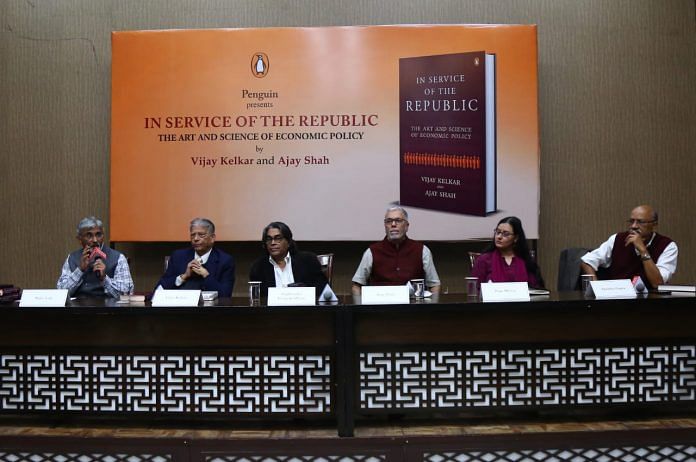New Delhi: Goods and Services Tax is an important policy change taken up by the government but it failed in terms of implementation, which was “not taken seriously”, economist Dr Vijay Kelkar and Professor Ajay Shah said during a panel discussion in Delhi Tuesday.
The occasion was the launch of In Service of the Republic, a book by Kelkar, who was the chairman of the 13th Finance Commission, and Shah, a professor at the National Institute of Public Finance and Policy.
Others who participated at the panel discussion included IDFC Bank non-executive chairman Rajiv Lall, India Development Foundation research director Shubhashish Gangopadhyay, Editor-in-Chief of ThePrint Shekhar Gupta and journalist Puja Mehra.
Former Prime Minister Manmohan Singh and 15th Finance Commission Chairman N.K. Singh were also present at the book launch.
The book
Coming at a time when the Indian economy is facing slowdown, In Service of the Republic talks about market economics, policy making and public administration. The book is a “singular attempt on what India needs to do to achieve a spurt in economy”, Kelkar has said on the introduction of the book that discusses the importance of individual freedom, individuality and economic freedom in order to achieve a sustainable economy for at least the next 30 years.
Speaking at the panel discussion, Shubhashis Gangopadhyay said, “The book makes it clear that if we believe in freedom, then we must believe in economic freedom too.”
Shekhar Gupta questioned the authors over increasing state capacity through a long-term process, like a cricket Test match, as mentioned in the book. “Going by the current political scenario, won’t the government succeed by engaging the most in policy making and implementation during the initial years, just like striking the maximum balls during powerplay in a T20 match?” Gupta asked.
In his reply, Shah said the key to resolving India’s economic upheavals is in long-term solutions, rather than short-term goals. “We need to find solutions that make the Indian economy sustainable. We need time to reach those horizons,” he added.
Gupta also asked the authors to comment on the decline of economic bureaucrats in India.
In his reply, economist Vijay Kelkar emphasised on the need for expansion of knowledge and “a system that supports it”. He also spoke about the need for building institutions of knowledge in the country.
“The fact that a book like this is still being written is good news, the best thing is that it not only talks about the economy, but also explores ideas on how the economy should be governed,” said Shekhar Gupta.
Lack of government data
The panelists discussed the implementation of GST in the country and said the important policy change taken up by the government was failure in terms of implementation.
In terms of policy making, said Ajay Shah, GST implementation was not taken seriously. He emphasised on the necessity of a proper methodology for tax collections and an efficient criminal justice system to increase the states’ economic capacity.
In order to achieve a stable economic growth, Shah added, “maturation of political parties into institutions” is important.
Journalist Puja Mehra pointed out the importance of submitting economic feedback to the GST councils, in order to achieve policy making goals. “Without data, economists are like doctors without stethoscopes,” said Rajiv Lall.
On a similar note, Gangopadhyay said the current policies are based on data that is three to four years old and that is why implementation of these policies is a big
problem.
Also read: ADB cuts India’s GDP rate to 5.1% in FY20, cites poor job growth & rural distress




In the service of Republic’worth a book on good governance.All knew that the job of a govt is administer’not business but many states govt are doing business why?They silence those who questions it on which I made a Research’Privatising the govt’but I need money to publish it as these so-called public servants had put all their power to cut all the financial chords. Any help to put it graphically from Kelkar,shah or the print? Thanks
It is possible to space out the pain of adjustment while undertaking structural reforms. In the power sector, tariffs for farmers could be gradually increased, allowing as much as a decade to reach the stage of full recovery of cost. If privatisation of virtually all PSBs was considered too ambitious in 2014, one or two of the weakest could have been sold each year. In the sphere of labour, existing protections could have been retained for units in operation, exempting new ones that would be set up. 2. Mann ki Baat provided a good medium to make the case directly to the people that the old ways were not working. It is not that the government went overboard on reform and came within inches of losing power. Niti Aayog could have contributed more.